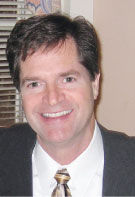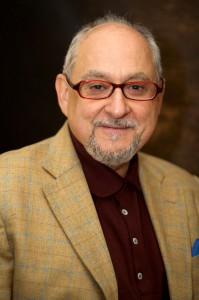 In a meeting billed as the “In-House Counsel Summit” on Wednesday afternoon, a panel of three legal leaders from prominent Silicon Valley hi-tech companies moderated by David Bruns, Director of Client Services at Farella Braun + Martel LLP, spoke to an audience of over fifty attendees about “Rising Above Your Competition – What Today’s Tech Industry General Counsel Expect From a Law Firm.” The Garden Court Hotel meeting was hosted by the Bay Area Chapter / Silicon Valley City Group of the Legal Marketing Association and emceed by Monica Kuniyoshi of K&L Gates and Jill Stolarik of Morrison & Foerster.
In a meeting billed as the “In-House Counsel Summit” on Wednesday afternoon, a panel of three legal leaders from prominent Silicon Valley hi-tech companies moderated by David Bruns, Director of Client Services at Farella Braun + Martel LLP, spoke to an audience of over fifty attendees about “Rising Above Your Competition – What Today’s Tech Industry General Counsel Expect From a Law Firm.” The Garden Court Hotel meeting was hosted by the Bay Area Chapter / Silicon Valley City Group of the Legal Marketing Association and emceed by Monica Kuniyoshi of K&L Gates and Jill Stolarik of Morrison & Foerster.
Creativity, flexibility, innovation, thinking outside the box, skilled in project management, and “lawyers who listen to us and know our business” were just some of the key factors a law firm should present to impress Lisa Konie, Director, Legal Operations of Adobe Systems.
Michael Haven, Senior Litigation and Operations Counsel for NetApp, Inc., illustrated Konie’s point. “When we were running short on funding for a matter, I called our law firm and explained the situation. Within an hour they called back and told me they were able to restructure the project and approach it in a different way so as to work within our remaining budget. This firm showed flexibility when we needed it, and sensitivity to the pressures we face, and gained a lot of our loyalty by doing so.”
Needless to say, fee and billing approaches are critically important. In fact, two of the panelists said they were moving away from the billable hour model and prefer alternate fee arrangements while one panelist stated, “I am actually mixed on billable hours/AFA. I think the latter is appropriate in some situations and prefer billable hours in other areas provided there is appropriate communication about expectations.” Some even said they would not work with a law firm that did not offer fixed fees on some matters. The panelists said in many cases they know what the value of a given specific matter is and one panelist stated, “Law firms find ways to become more efficient when they are on a fixed fee.” All emphasized that a firm must demonstrate efficient use of their company’s time and money. “We are not willing to pay for twenty hours of training for a first year lawyer on a basic commercial transaction,” emphasized one panelist.
Haven said in some cases he likes to work with a 10% collar around a fixed fee. That is, if the actual cost is within10% of the agreed fee, his company will pay the agreed-upon fee. However, if the real cost is more than 10% higher, he will entertain renegotiating the fee upward. Similarly, if the actual cost is more than 10% lower than the agreed fee, he also wants to negotiate a reduction in the fee.
The panel agreed that they expect outside counsel to be extremely knowledgeable about their industry. “And it’s a big bonus to the relationship,” added Haven, “if the law firm is buying and using our products and services. It’s like reverse selling.” Konie agreed that using Adobe products can help build rapport.
It was universally agreed that diversity is important and desired in the law firms they work with but on any given RFP, it is not the primary deciding factor when choosing outside counsel. Yet, diversity is primary in some situations. One panelist stated, “A law firm representing them who puts three older white men in front of a young diversified jury would not be rehired. It’s important that the trial lawyers mirror the jury as much as possible.”
The panel was divided about dealing with a partner from one of their preferred law firms who switches to another firm. Jan Kang, Vice President and General Counsel of AOptix said, “We work with lawyers, not with law firms” and would be in support of following the switching partner to his/her new law firm. On the other hand, Konie noted that, having labored long and hard to create a panel of preferred law firms, having whittled 1,000 law firms down to 30, she would be hard pressed to deviate from her panel.
On the other hand, all agreed that, other than the rare outside expert, building a relationship was paramount. For example, one panelist pointed out that it would be better to pitch to someone on the in-house team with whom you have a pre-existing relationship rather than the GC with whom you have no prior relationship.
The panel agreed that trust is an absolute essential component when working with or selecting an outside law firm. The panelists agreed that “Building trust was everything.” And one way to build that trust is for outside counsel to demonstrate that they understand that the GC and the GC’s legal team have to answer to a CFO, a finance committee and others. Lawyers who make it clear that they are sensitive to and appreciate the pressures on the in-house legal department will further endear themselves to in-house counsel.
All three panelists like their outside counsel to provide value-added services. Examples would be: training their legal personnel as to what they can and cannot do in a given legal area, sending them relevant information on changes in the law that the in-house legal team may have missed including any pertinent cases, doing free research for them, and sending them memos, at no cost to them, that may have been prepared while working on another matter elsewhere, but would also be of interest to them.
One panelist explained that, “We are contacted by many law firms offering to help us when they see an action has been filed against us. That alone does not get our attention. But when we are contacted in a different way, such as ‘I saw X law firm filed an action against you the other day. Did you know that they also filed the following actions that same day?’ Or the lawyer offers some special insight into the firm filing against us, or suggests some special legal tactic that might be considered. That value-add will get our attention.”
As to providing information, they agreed that they don’t generally read blogs but they like e-newsletters that have direct relevant information that they can use. On occasion, one panelist offered, they will start to look at a video related to a topic of interest, but if the spokesperson in the video is not captivating, that ends the review and reduces the likelihood that the panelist will look at another video by that provider.
A MarCom note: Marketing leave behinds are not reviewed by these three panelists. They just don’t have the time. Sorry.
When a new law firm approaches a potential in-house counsel client, they should take the long view. For example, Kang said she is very disappointed when a lawyer makes an enthusiastic pitch for a particular matter, but if turned down, acts like they’ve been hurt and their enthusiasm for the relationship has suffered an irreversible set-back. Kang said, and the other panelists agreed, they like to work with lawyers who are in it for the long haul.
About the authors:
 Dr. David King Keller is the award-winning author of 100 Ways to Grow a Thriving Law Practice and the ABA best seller, The Associate as Rainmaker: Building Your Business Brain. Keller is a keynote speaker, business development trainer / coach, and delivers business development training within an Ethics CLE titled Ethical Business Development Strategies. Contact him at david@kbdag.com or 415-289-0544 by cell 415-444-6795. Follow him on Twitter: @davidkingkeller
Dr. David King Keller is the award-winning author of 100 Ways to Grow a Thriving Law Practice and the ABA best seller, The Associate as Rainmaker: Building Your Business Brain. Keller is a keynote speaker, business development trainer / coach, and delivers business development training within an Ethics CLE titled Ethical Business Development Strategies. Contact him at david@kbdag.com or 415-289-0544 by cell 415-444-6795. Follow him on Twitter: @davidkingkeller
 Jeffrey F. Silber is a partner of Silber, Vasquez & Associates, a San Francisco-based, international life coaching firm specializing in legal marketing at the individual lawyer level with an extensive practice in Mexico and Brazil. He is a CPA, holds an MBA and is a Certified Master Life, Legal and Business Coach. www.svacaoches.com. Contact Jeffrey at 415-829-2660, or jeffrey.silber@svacoaches.com.
Jeffrey F. Silber is a partner of Silber, Vasquez & Associates, a San Francisco-based, international life coaching firm specializing in legal marketing at the individual lawyer level with an extensive practice in Mexico and Brazil. He is a CPA, holds an MBA and is a Certified Master Life, Legal and Business Coach. www.svacaoches.com. Contact Jeffrey at 415-829-2660, or jeffrey.silber@svacoaches.com.





0 comments on “Innovation Needed to Attract Silicon Valley In-House Counsel”